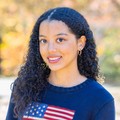My identity is like a lehenga, a beautifully layered South Asian garment that embodies tradition and celebration, adorned with simplicity and delicate threads, yet often looked down upon. Coming from a small town in Pakistan and humble beginnings, I carry these layers as a reminder of what I used to be and where I came from. The blend of the old and new creates a rich tapestry that tells the story of who I am. My name, Sameeha, is one such thread; it often stands out in class, drawing curious glances or hesitant mispronunciations. Yet for me, it binds my identity, connecting the strength of my Pakistani roots with the evolving narrative of my life in the United States.
My journey to the U.S. marked both an opening and a closing—a transition to new patterns while letting go of the familiar. When my family and I arrived in New York City, I was nine, stepping into a bustling, unfamiliar world. In Pakistan, I had been surrounded by the comfort of familiar faces, and my name carried stories and history, spoken in a language that rolled effortlessly from my tongue. However, on my first day of school in America, I realized the weight of my difference. As my teacher stumbled over “Sa-me..e-ha,” the sound of my name, once warm and familiar, felt foreign, leaving me with a sense of being othered
I often felt like I didn’t fit in, however, I began to understand that identity is not static; it’s an evolving interplay of experiences and choices. As I navigated this new environment, each challenge and triumph added colors and textures to my tapestry and layers to my lehenga. As a freshman at Staten Island Tech, I struggled to find people I could relate to, which inspired me to create the Muslim Students Association (MSA)—a platform for us to celebrate and share our traditions. I needed a space to stay connected to my heritage, but more importantly, I wanted to foster a sense of belonging for others as well.
Coming from a background with limited health facilities, I seized the unique opportunities in NYC to develop a passion for research and science. My research journey led me to investigate real-world issues, such as the correlation between backpack weight and back pain, the impact of urbanization on the Bronx River, and bacterial diversity in local ponds. These experiences sparked my desire to serve underserved communities, particularly immigrant families, by bridging the gap between healthcare and cultural understanding.
Throughout life, my journey has been like learning to pronounce my name—a name which means "generous" and "forgiving," values I strive to live by. Despite challenges expressing myself, my embroidered patterns fit together, creating a vibrant tapestry of belonging and resilience. As I move forward, I wear my identity like a lehenga, embracing both tradition and modernity, aiming to create health programs that empower diverse communities.
My name is Justin Lopez, and I am currently a senior attending White Plains High School. I am my school’s co-founder and co-president of History Club, I have been the varsity wrestling captain, I participate in Youth and Government, and I am one of the National Honors Society vice presidents.
I aspire to practice law. During my time in elementary school, I can vividly remember accompanying my mother to an immigration firm to eventually become a citizen of the United States, and I was intrigued at the process she went through. This curiosity led me to an interest in law, and a lot of the things I do in my life revolve around the social sciences, and today, I am grateful and honored to say that I have been able to help my community in various ways, whether it be tutoring students for AP exams or advertising service opportunities for them in our school’s study center.
However, to me, this is not enough; I feel like I can make a more impactful and meaningful contribution to my community and the world through my aspirations in becoming a lawyer.
I can remember how helpful and caring my mother’s lawyer was. Through his attentiveness and dedication to helping her, he succeeded in securing her American citizenship. Whether it be securing someone citizenship, defending someone in criminal or family court, or even being someone’s counsel in a civil suit, having the opportunity to impact someone’s life to this level continues to motivate me as I inch closer and closer to higher education and serves as the final goal.
I know what it is like to come from an underprivileged community; I was born into one, and I have lived in one my entire life. The Hispanic community in the United States is a community in need, and with many of us struggling to secure legal status and become more than just a people associated with crime and hard labor, these small, yet meaningful steps will help our people succeed in the world.
Plenty of my family has resorted to working menial jobs just to get by because they had no other opportunity, but with legal counsel, this could change for most of them. Legal counsel for them is an opportunity; not just one to have their papers and be safe from a hostile government, but an opportunity to become successful and bring to life the almost-dead American dream.
I have seen our people be wrongfully deported, and I have seen our people suffer so their children to succeed. Their struggles motivate my successes, and I want to make the world a better place for them, so they, or their children, no longer have to struggle.





